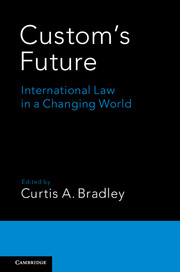Book contents
- Frontmatter
- Dedication
- Contents
- Notes on Contributors
- Introduction: Custom's Future
- 1 Custom's Past
- 2 Customary International Law Adjudication as Common Law Adjudication
- 3 Customary International Law as a Dynamic Process
- 4 Custom, Jus Cogens, and Human Rights
- 5 Customary International Law: How Do Courts Do It?
- 6 Custom's Method and Process: Lessons from Humanitarian Law
- 7 The Growing Obsolescence of Customary International Law
- 8 The Strange Vitality of Custom in the International Protection of Contracts, Property, and Commerce
- 9 The Decline of Customary International Law as a Source of International Criminal Law
- 10 Customary International Law and Public Goods
- 11 Reinvigorating Customary International Law
- 12 The Evolution of Codification: A Principal-Agent Theory of the International Law Commission's Influence
- 13 Custom and Informal International Lawmaking
- 14 Custom's Bright Future: The Continuing Importance of Customary International Law
- Bibliography
- Index
11 - Reinvigorating Customary International Law
Published online by Cambridge University Press: 05 February 2016
- Frontmatter
- Dedication
- Contents
- Notes on Contributors
- Introduction: Custom's Future
- 1 Custom's Past
- 2 Customary International Law Adjudication as Common Law Adjudication
- 3 Customary International Law as a Dynamic Process
- 4 Custom, Jus Cogens, and Human Rights
- 5 Customary International Law: How Do Courts Do It?
- 6 Custom's Method and Process: Lessons from Humanitarian Law
- 7 The Growing Obsolescence of Customary International Law
- 8 The Strange Vitality of Custom in the International Protection of Contracts, Property, and Commerce
- 9 The Decline of Customary International Law as a Source of International Criminal Law
- 10 Customary International Law and Public Goods
- 11 Reinvigorating Customary International Law
- 12 The Evolution of Codification: A Principal-Agent Theory of the International Law Commission's Influence
- 13 Custom and Informal International Lawmaking
- 14 Custom's Bright Future: The Continuing Importance of Customary International Law
- Bibliography
- Index
Summary
For decades now, some legal commentators have suggested that customary international law (CIL) is dying. Looking out at the world, one might be excused for agreeing with them. As a general trend, states have been codifying the contents of CIL through bilateral and multilateral consent-based agreements. This trend toward codification could be interpreted as diminishing the general impact of CIL by making most of its content redundant if not irrelevant. Furthermore, the content and the process by which CIL comes about is often considered to be largely outside the direct control of states, making it difficult for states to interact with and shape CIL in purposive ways. In a world where urgent global problems require timely and coordinated solutions, CIL seems inadequate as a useful legal form. Finally, it is often difficult to determine the legal content of CIL, leading to an impression that modern CIL is more speculative than functional. It is little wonder, then, that some have argued that CIL will soon be largely irrelevant.
But reports of CIL's demise are greatly exaggerated. At the base of it, CIL is an integral and necessary part of the international legal system. Perhaps more importantly, it is also a tool that can promote cooperation in situations where consent-based rulemaking proves impractical. Indeed, while there are many well-known advantages to the current international legal system predicated on consent, there are also substantial drawbacks. Efforts at consent-based rulemaking can often be bogged down by recalcitrant states. States can avoid new legal obligations either by refusing to consent or simply dragging their feet. For global problems that require at least the acquiescence – if not the direct participation – of specific states this kind of strictly consent-based system can create delays or even outright breakdowns in cooperation. These, in turn, can reduce global well-being.
In this chapter, we argue that one potential solution to the challenges raised by consent-based rulemaking is to lean more heavily on nonconsensual international law such as CIL as a way to promote global cooperation. We believe that, while CIL in its current form is not entirely coherent conceptually, it can nevertheless be reinvigorated for the cooperative benefit of modern states.
- Type
- Chapter
- Information
- Custom's FutureInternational Law in a Changing World, pp. 275 - 304Publisher: Cambridge University PressPrint publication year: 2016
- 2
- Cited by



